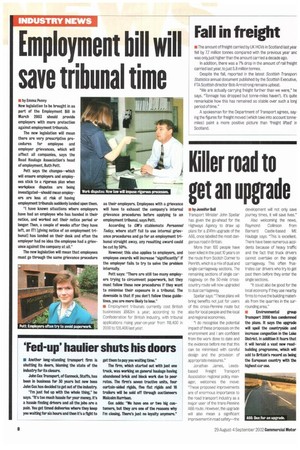Employment bill will Fall in freight
Page 8

If you've noticed an error in this article please click here to report it so we can fix it.
• The amount of freight carried by UK HGVs in Scotland last year fell by 7.7 million tonnes compared with the previous year anc was only just higher than the amount carried a decade ago.
save tribunal time
• by Emma Penny New legislation to be brought in as part of the Employment Bill in March 2003 should provide employers with more protection against employment tribunals.
The new legislation will mean there are very prescriptive procedures for employee and employer grievances, which will affect all companies, says the Road Haulage Association's head of employment. Ruth Pott.
Pott says the changes—which will ensure employers and employees stick to a rigorous plan when workplace disputes are being investigated—should mean employers are less at risk of having employment tribunals suddenly landed upon them.
"I have known situations where employers have had an employee who has handed in their notice, and worked out their notice period or longer. Then, a couple of weeks after they have left, an Ill [giving notice of an employment tribunal] has landed on their desk and often the employer had no idea the employee had a grievance against the company at all."
The new legislation will mean that employees must go through the same grievance procedure as their employers. Employees with a grievance will have to exhaust the company's internal grievance procedures before applying to an employment tribunal, says Pott.
According to CH's stablemate Personnel Today, where staff fail to use internal grievance procedures and go for an employment tribunal straight away, any resulting award could be cut by 50%.
However, this also applies to employers, and employee awards will increase "significantly" if the employer fails to try to solve the problem internally.
Pott says: "There are still too many employers trying to circumvent paperwork, but they must follow these new procedures if they want to minimise their exposure in a tribunal. The downside is that if you don't follow these guidelines, you are more likely to lose."
• Employment tribunals currently cost British businesses £663m a year, according to the Confederation for British Industry, with tribunal applications rising year-on-year from 118,400 in 2000 to 128,406 last year.
















































































































































